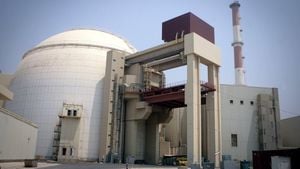North Korea’s military involvement with Russia during the Ukraine war has stirred significant geopolitical tension, pushing countries like Japan to reassess their defensive strategies and commitments. Recently, reports surfaced detailing how Russia has been supplying North Korea with extensive military resources, including air defense systems and missiles, totaling over one million barrels of oil as part of a reciprocal agreement for North Korean support on the battlefield.
According to the _Institute for the Study of War (ISW)_, this burgeoning partnership has been characterized by Russia dispatching substantial military aid to North Korea, which, in return, has been providing manpower and military troops to assist Russia’s efforts against Ukraine. Since March 2024, satellite imagery analysis from the Open-Source Centre, based out of the UK, revealed over 43 instances of North Korean tankers arriving at Russian oil terminals, empty, and returning filled with oil shipments.
The illicit trade, which blatantly violates United Nations sanctions aimed at curtailing North Korea’s access to resources and curtailing its weapons programs, raises alarms. David Lammy, the UK's Foreign Secretary, directly linked these oil deliveries to North Korea’s military assistance to Russia.
South Korean National Security Advisor, Shin Won-sik, also disclosed key information about the military exchanges, highlighting Russia’s provision of advanced air defense equipment to North Korea. Although specific details are scant, experts express concerns about the potential delivery of sophisticated systems, possibly including the S-400 missile systems. Such events signal a possible shift, as delivering these advanced systems could solidify Russia’s military endorsements to North Korea, significantly altering their previous international military alignments.
But what does this mean for other nations? Japan, situated just across the Sea of Japan, is feeling the pressure. Japan’s Foreign Minister, Takeshi Iwaya, has voiced his grave concern over this military cooperation between North Korea and Russia, calling for fresh sanctions against Pyongyang and reaffirming Tokyo’s strong backing for Ukraine amid this adverse shift. During recent discussions with his Ukrainian counterpart, Andrii Sybiha, Iwaya emphasized creating avenues for exchanging classified security information and enhancing defense coordination through high-level dialogues between both nations’ defense officials.
Meanwhile, Prime Minister Denys Shmyhal of Ukraine met with Minister Iwaya separately, during which they renewed commitments ensuring support for Ukraine’s energy needs as winter looms. Japan promises to send generators and various equipment, which could cushion some of the harsh realities faced as the cold sets in.
This increasing military cooperation between Russia and North Korea sends ripples through international relations. Countries concerned about regional stability, particularly Japan, find themselves amid shifting alliances and rising military tensions. Experts indicate changes might not just solidify the ties between these two nations; there’s also the potential risk of undermining United Nations efforts to regulate arms proliferation and curtail North Korea’s activities on the global stage.
The fallout isn't limited to just the Russia-North Korea axis. The geopolitical chessboard encompasses nations beyond the immediate affected parties, drawing various countries, such as Japan, closer together as they devise strategies to combat shared threats. The latest developments hint at growing military alliances, resulting from both necessity and circumspection, as nations position themselves to counterbalance rising adversarial threats.
Analysts are keeping a watchful eye on how this partnership evolves, particularly as Russia continues to face logistical challenges against Ukraine, dealing not only with troop shortages but also strained production lines for its own military hardware. This opens up opportunities for North Korea to step up its contributions, providing personnel to plagued battalions or offering its military expertise to bolster Russian positions.
While the dynamics change, the international community remains puzzled about how to effectively engage with both Russia and North Korea. The continued military support and indicate close cooperation might not only pose new challenges for Ukraine but also set off alarm bells over the potential for military escalations or uncontrollable arms proliferation.
North Korea’s military affiliation with Russia could affect the security architecture of the Asia-Pacific region deeply. Japan’s government faces intense pressure to step up its military postures and strategic alliances, particularly as more North Korean soldiers are rumored to be on their way to assist Russian troops.
The door to the military collaboration between North Korea and Russia seems to be wide open, creating precarious situations for many countries. Alongside Japan's earnest efforts to assist Ukraine, the geopolitics surrounding these nations will continue to evolve, necessitating urgent responses from neighboring allies.
The stakes involve not just the immediate security of nations directly involved but also the larger global framework intended to maintain peace and security. While many nations aim to uphold international laws and restraints on military support among rogue states, the situation remains fraught with risks, swirling change, and uncertainty.



